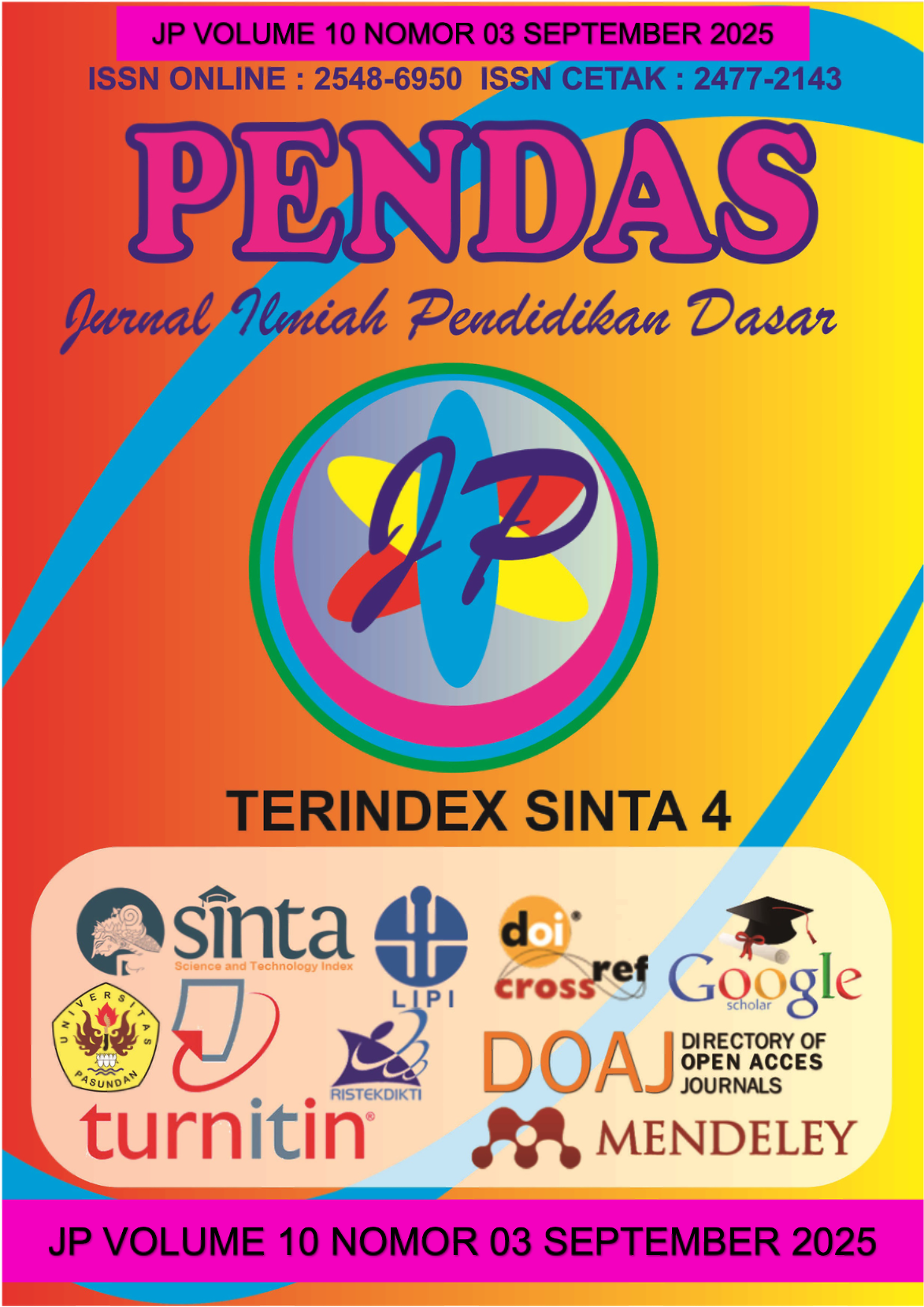GENERASI CERDAS DIGITAL: TINJAUAN LITERATUR SISTEMATIS PELUANG DAN TANTANGAN LITERASI DIGITAL DI SEKOLAH DASAR
DOI:
https://doi.org/10.23969/jp.v10i03.31973Keywords:
digital literacy, elementary education, access gap, hybrid learningAbstract
This study aims to examine the digital literacy practices of Indonesian elementary school students in overcoming technology access gaps. A systematic literature review was conducted across Scopus, Web of Science, and Google Scholar for publications from 2020 to 2025. Following PRISMA guidelines and using narrative synthesis, 10 empirical studies were selected based on their focus on student-centered strategies under constrained infrastructure. Findings reveal that students employ collaborative scheduling of school computer labs and community centers; leverage personal smartphones with peer-to-peer sharing via Bluetooth and messaging apps; integrate offline materials such as printed modules and USB flash drives; and utilize “lite” versions of digital quiz platforms for formative assessment. Additionally, single-download interactive content (e.g., PhET simulations, Extended Reality recordings) is repeatedly accessed offline. These adaptive practices underscore the critical role of teachers in designing hybrid learning packages and highlight the need for supportive policies standardized offline modules, teacher training in blended pedagogy, and development of bandwidth-optimized digital platforms to ensure inclusive and sustainable digital literacy.
Downloads
References
Amit Patel, & Schleicher, A. (2024). Shaping the Future of Learning: The Role of AI in Education. In World Economic forum (Issue April).
Amri, C. O., Jaelani, A. K., & Saputra, H. H. (2021). Peningkatan Literasi Digital Peserta Didik : Studi Pembelajaran Menggunakan E-Learning. 1–6.
Critical Appraisal Skills Programme. (2010). Making sense of evidence about clinical effectiveness 10 questions to help you make sense of a review: Are the results of the review valid ? In Creative Commons Attribution (pp. 0–2). http://www.casp-uk.net/wp-content/uploads/2011/11/CASP_RCT_Appraisal_Checklist_14oct10.pdf
Dorongon, M. A., & Sarmiento, J. R. (2025). Teachers’ Readiness for Artificial Intelligence Integration in Teaching and Learning. 13(5), 812–821. www.globalscientificjournal.com
Kususma, T. Y., & Cahyani, I. (2025). Analysis of ANBK-Based Literacy Skills and Digital Literacy Capability of Elementary School Students. The 7th International Conference on Elementary Education, 7(1), 1003–1016.
Lytvynova, S., & Demeshkant, N. (2022). Distance Learning in Primary School during the COVID 19 Pandemic: Results of the “SMART KIDS” Experiment. CEUR Workshop Proceedings, 3104(Icteri 2021), 1–10. https://doi.org/10.31812/educdim.4718
Mahrani, M., Sari, S. M., & Siregar, S. D. (2022). Transformation of literacy program implementation based on digital learning platform in the era of disruption in Indonesia. International Journal of Health Sciences, 6(April), 9728–9737. https://doi.org/10.53730/ijhs.v6ns2.7534
Mansor, N., Ahmad, N., Said, S. M., Tan, K.-A., & Sutan, R. (2023). Effectiveness of a Theory-Based Digital Animated Video Intervention to Reduce Intention and Willingness to Sext Among Diploma Students: Cluster Randomized Controlled Trial. Journal of Medical Internet Research, 25. https://doi.org/10.2196/48968
Masyhura, N., & Ramadan, Z. H. (2021). Implementation of Digital Literacy in Elementary Schools. International Journal of Elementary Education, 5(4), 639. https://doi.org/10.23887/ijee.v5i4.39480
Moher, D., Liberati, A., Tetzlaff, J., Altman, D. G., Antes, G., Atkins, D., Barbour, V., Barrowman, N., Berlin, J. A., Clark, J., Clarke, M., Cook, D., D’Amico, R., Deeks, J. J., Devereaux, P. J., Dickersin, K., Egger, M., Ernst, E., Gøtzsche, P. C., … Tugwell, P. (2009). Preferred reporting items for systematic reviews and meta-analyses: The PRISMA statement. PLoS Medicine, 6(7). https://doi.org/10.1371/journal.pmed.1000097
Nangimah, T., & Dharin, A. (2023). Implementation of ICT-Based Learning Media to Enhance Digital Literacy in Elementary Schools. INTERNATIONAL JOURNAL OF MULTIDISCIPLINARY RESEARCH AND ANALYSIS, 06(10), 4806–4814. https://doi.org/10.47191/ijmra/v6-i10-35
Okoli, C. (2015). A guide to conducting a standalone systematic literature review. Communications of the Association for Information Systems, 37(1), 879–910. https://doi.org/10.17705/1cais.03743
Okoli, C., & Schabram, K. (2010). A Guide to Conducting a Systematic Literature Review of Information Systems Research. SSRN Electronic Journal, 10(2010). https://doi.org/10.2139/ssrn.1954824
Popay, J., Roberts, H., Sowden, A., Petticrew, M., Arai, L., Rodgers, M., & et all. (2006). Guidance on the conduct of narrative synthesis in systematic reviews. a product from the a product from the ESRC methods programme. Esrc, version 1(April 2006), 1–92. https://www.researchgate.net/publication/233866356_Guidance_on_the_conduct_of_narrative_synthesis_in_systematic_reviews_A_product_from_the_ESRC_Methods_Programme?channel=doi&linkId=02e7e5231e8f3a6183000000&showFulltext=true%0Ahttps://www.researchgate.net/
Priadi, M. A., Lengkana, D., & Yosita, D. (2025). Using PhET simulation as guided inquiry-assisted virtual biology laboratory to enhance science literacy skills of junior high school students in West Lampung. Assimilation: Indonesian Journal of Biology Education, 8(1), 91–100. https://vm36.upi.edu/index.php/asimilasi/article/view/80287
Rohmah, B. F., & Anam, C. (2023). Analysis of Digital-Based Elementary School Learning Assessment Applications Balqis. EDUCARE: Jurnal Ilmu Pendidikan, 02(01), 1–15.
Suwarto, D. H., Setiawan, B., & Machmiyah, S. (2022). Developing Digital Literacy Practices in Yogyakarta Elementary Schools. Electronic Journal of E-Learning, 20(2), 101–111. https://doi.org/10.34190/ejel.20.2.2602
Tomczyk, Ł. (2025). AI in Education - Mapping Theoretical Frameworks for Digital Literacy: DigComp 2.2, AI Literacy Competency Framework, AI Literacy TPACK, the Machine Learning Education Framework, the UNESCO AI Competency Framework for and Teachers and Other Innovative Approaches. Communications in Computer and Information Science, 2537 CCIS, 173–191. https://doi.org/10.1007/978-3-031-95627-0_12
UNESCO. (2024). Transforming Education Towards SDG 4.
UNESCO. (2025). Digital Learning Week 2025 Steering Tachnology for Education (pp. 1–4). https://survey.alchemer.com/s3/8196585/AI-and-the-Futures-of-Learning-Disruptions-Dilemmas-and-Directions
UNICEF. (2021). Situation Analysis on Digital Learning in Indonesia. https://www.unicef.org/indonesia/media/8766/file/DigitalLearningLandscapeinIndonesia.pdf
Utaminingsih, E. S., & Ellianawati, E. (2025). Development of Steam-Based E-Modules on Human Circulatory Topics Containing Critical Reasoning and Independent Characters. Turkish Online Journal of Distance Education-TOJDE, 26(1), 48–84.
Utaminingsih, E. S., Idammatussilmi, I., Intania, B. Y., & Kristiyuana, K. (2025). An Interactive Qur’anic Values-Based Affective-Learning Approach to Mitigating School Bullying. Suhuf, 37(1), 237–249. https://doi.org/10.23917/suhuf.v37i1.10637
Wenge, M. (2021). Artificial intelligence-based real-time communication and ai-multimedia services in higher education. Journal of Multiple-Valued Logic and Soft Computing, 36(1), 231–248. https://www.scopus.com/inward/record.uri?eid=2-s2.0-85108330080&partnerID=40&md5=9d2751efd13ed63b082b01eb5c52a452
Wijayanti, A., Dwiningrum, S. I. A., & Saptono, B. (2025). Enhancing Digital Literacy and Science Understanding: The Impact of a Guided Inquiry-Based Flipped Classroom in Elementary Schools. International Journal of Information and Education Technology, 15(7), 1477–1486. https://doi.org/10.18178/ijiet.2025.15.7.2349
Downloads
Published
Issue
Section
License
Copyright (c) 2025 Pendas : Jurnal Ilmiah Pendidikan Dasar

This work is licensed under a Creative Commons Attribution 4.0 International License.














































